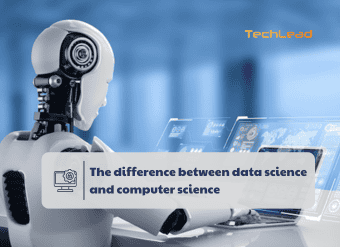In the era of Industry 4.0, technology is crucial. Data Science and Computer Science playkey roles in this landscape. This article aims to distinguish between these two vital fields and applications in today’s technological world.
I. Basic Definitions: What is Data Science? What is Computer Science?
What is Data Science? What is Computer Science? (Collected)
Data Science is an interdisciplinary field that utilizes scientific methods, processes, algorithms, and systems to extract knowledge and insights from structured and unstructured data. It combines techniques from statistics, mathematics, and computer science to analyze, interpret, and visualize data, aiming to derive actionable insights and inform decision-making. Data scientists often work with large datasets, employing machine learning models and data mining techniques to predict trends and uncover hidden patterns.
On the other hand, Computer Science is a broader field that encompasses the study of algorithms, data structures, programming languages, and the design and analysis of software and hardware systems. It focuses on understanding the theoretical foundations of computation and developing efficient solutions to computational problems. Computer scientists may engage in a variety of activities, such as software development, system architecture design, artificial intelligence research, and cybersecurity. While data science leverages computer science principles, it is distinct in its emphasis on data-driven discovery and application.
II. Objectives and Scope
1. Data Science
Objectives and Scope in Data Science
The primary objective of data science is to extract valuable insights from data. This field focuses on understanding complex datasets and using statistical methods to uncover hidden patterns, trends, and correlations. Data scientists utilize various techniques, such as data mining, statistical analysis, and machine learning, to analyze large volumes of data. Their goal is to make data-driven decisions that can enhance business strategies, optimize operations, and drive innovation. The scope of data science encompasses a wide range of activities, including data collection, cleaning, exploration, modeling, and visualization. By leveraging tools like Python, R, and SQL, data scientists transform raw data into actionable insights that can significantly impact various industries, from healthcare to finance.
2. Computer Science
The main objective of computer science is to develop and optimize software and systems. This discipline focuses on designing algorithms, creating efficient data structures, and understanding the underlying principles of computer hardware and software. Computer scientists aim to solve complex computational problems by developing innovative solutions that enhance the functionality and performance of computer systems. The scope of computer science includes areas such as algorithms, data structures, operating systems, and network security. Professionals in this field work on creating robust software applications, designing operating systems, and ensuring the security and integrity of data. By using programming languages like C++, Java, and Python, computer scientists build the foundational technologies that drive modern computing and enable advancements in various technological domains.
III. Skills and Tools in Data Science and Computer Science
1. Essential Skills
Data Science: Proficiency in statistics, analytical thinking, programming, and data visualization are critical skills in data science. Statistical skills enable data scientists to understand and interpret complex datasets, drawing meaningful conclusions from data. Analytical thinking is crucial for identifying patterns, trends, and insights that can drive decision-making processes. Programming skills, particularly in languages such as Python and R, are fundamental for manipulating data, performing complex calculations, and implementing machine learning algorithms. Data visualization skills allow data scientists to present data in a clear and concise manner, making it easier for stakeholders to understand and act on insights.
Computer Science: Expertise in programming, algorithm design, operating systems, and networking is essential for computer scientists. Programming skills in languages such as C++, Java, and Python are fundamental for developing software and solving computational problems. Algorithm design involves creating efficient solutions for complex problems, which is a core aspect of computer science. Knowledge of operating systems is crucial for understanding how software interacts with hardware and managing system resources effectively. Networking skills are important for designing, implementing, and managing networked systems, ensuring secure and efficient communication between devices.
2. Popular Tools
Data Science: Popular tools in data science include Python, R, SQL, and TensorFlow. Python is widely used for its simplicity and versatility, offering extensive libraries for data analysis and machine learning. R is a powerful language specifically designed for statistical computing and graphics, making it a favorite among statisticians. SQL (Structured Query Language) is essential for managing and querying relational databases, enabling data scientists to extract and manipulate data efficiently. TensorFlow, an open-source machine learning framework, allows data scientists to build and deploy machine learning models at scale.
Computer Science: In computer science, popular tools include C++, Java, Python, and Git. C++ is valued for its performance and control over system resources, making it ideal for developing high-performance applications. Java is known for its portability across platforms, making it a popular choice for enterprise-level applications. Python, with its readability and versatility, is also extensively used in computer science for scripting and automation tasks. Git, a version control system, is indispensable for managing code changes, enabling collaboration among developers, and maintaining the integrity of codebases.
Tools in Computer Science (Collected)
IV. Practical Applications
1. Data Science
Applications in Business: Market Analysis, Trend Prediction
Data science plays a crucial role in the business sector by enabling companies to perform market analysis and predict trends. By utilizing advanced statistical methods and machine learning algorithms, businesses can analyze large datasets to uncover patterns and insights that inform strategic decisions. For instance, retailers can predict consumer behavior, optimize inventory management, and personalize marketing campaigns. Financial institutions use data science to forecast market trends, manage risks, and enhance customer service. The ability to accurately predict trends allows companies to stay competitive and adapt to changing market conditions effectively.
Applications in Healthcare: Disease Diagnosis, Genomic Analysis
In healthcare, data science has transformative applications in disease diagnosis and genomic analysis. By applying machine learning models to medical data, healthcare professionals can diagnose diseases more accurately and swiftly. For example, predictive analytics can help in early detection of diseases such as cancer or diabetes, leading to better patient outcomes. Genomic analysis powered by data science enables researchers to understand genetic variations and their implications on health. This knowledge can lead to personalized medicine, where treatments are tailored to an individual’s genetic makeup, improving the efficacy of medical interventions and reducing adverse effects.
2. Computer Science
Applications in Software Development: Mobile Applications, Web
Computer science is fundamental to the development of software, including mobile applications and web platforms. Software developers use programming languages such as Java, Python, and Swift to create robust and scalable applications. Mobile applications, from social media platforms to productivity tools, rely on computer science principles for design, functionality, and performance optimization. Similarly, web development involves front-end and back-end technologies, databases, and APIs to build dynamic and interactive websites. Innovations in computer science continuously drive the evolution of software development, enhancing user experience and functionality.
Applications in Cybersecurity: Information Security, Intrusion Detection
Cybersecurity is a critical application of computer science focused on protecting information systems from threats and unauthorized access. Techniques such as encryption, firewalls, and intrusion detection systems are employed to safeguard sensitive data. Information security ensures the confidentiality, integrity, and availability of data by preventing breaches and mitigating risks. Intrusion detection systems (IDS) monitor network traffic for suspicious activities and potential threats, allowing organizations to respond swiftly to security incidents. As cyber threats become increasingly sophisticated, advancements in computer science are essential to develop more effective security measures and protect digital assets.
V. Career Opportunities
1. Career Opportunities in Data Science
Job Positions in Data Science
Job Positions in Data Science (Collected)
In the field of data science, there are several key job roles that professionals can pursue. A Data Scientist is responsible for extracting insights from complex data sets using statistical and computational techniques. They work on creating predictive models and algorithms to solve business problems. A Data Analyst focuses on interpreting data and generating actionable insights through data visualization and reporting. They often use tools like SQL, Excel, and Tableau to help organizations understand trends and patterns in their data. Another critical role is that of a Machine Learning Engineer, who designs and implements machine learning models and systems. They work with large data sets and leverage frameworks like TensorFlow and PyTorch to build and deploy scalable machine learning solutions.
Hiring Trends and Market Demand
The demand for data science professionals continues to grow rapidly across various industries. Businesses are increasingly recognizing the value of data-driven decision-making, leading to a surge in hiring Data Scientists and Data Analysts. According to recent job market analyses, there is a high demand for Machine Learning Engineers as organizations seek to integrate AI and machine learning capabilities into their operations. This trend is driven by the need for automation, predictive analytics, and personalized customer experiences. The competitive landscape for data science roles means that candidates with strong technical skills, domain knowledge, and the ability to communicate findings effectively are highly sought after.
2. Career Opportunities in Computer Science
Job Positions in Computer Science
Computer science offers a diverse range of career opportunities. A Software Developer is tasked with designing, coding, testing, and maintaining software applications. They use programming languages such as Java, Python, and C++ to develop solutions that meet user requirements. A System Architect plays a crucial role in designing the overall architecture of IT systems, ensuring that they are scalable, reliable, and efficient. They often work closely with stakeholders to translate business requirements into technical specifications. Network Engineers are responsible for designing, implementing, and managing an organization’s network infrastructure. They ensure that networks are secure, optimized, and capable of supporting the company’s communication needs.
Hiring Trends and Market Demand
The job market for computer science professionals remains robust, with a strong demand for Software Developers, System Architects, and Network Engineers. The rapid pace of technological advancement and digital transformation initiatives across industries contribute to this demand. Software Developers, in particular, are in high demand as businesses continually seek to create new applications and improve existing ones. System Architects are essential for organizations looking to modernize their IT infrastructure and leverage cloud computing technologies. Network Engineers are crucial for maintaining the integrity and performance of network systems, especially as remote work and cloud services become more prevalent. Companies are actively seeking candidates with up-to-date technical skills, experience with emerging technologies, and the ability to adapt to rapidly changing environments.
VI. Conclusion
To summarize, data science focuses on extracting insights from data using statistical analysis and machine learning, while computer science centers on software development, algorithms, and computing technologies. Each field offers distinct benefits and challenges. Data science enables data-driven decision-making and trend prediction but faces issues like data privacy. Computer science equips professionals with skills in software design and AI but requires constant adaptation to technological advancements.
Choosing between these fields should align with personal interests and skills. Data science suits those interested in data analysis and business insights, while computer science appeals to those passionate about software development and system architecture. Continuous learning is crucial in both fields to keep pace with technological advancements and stay competitive.





